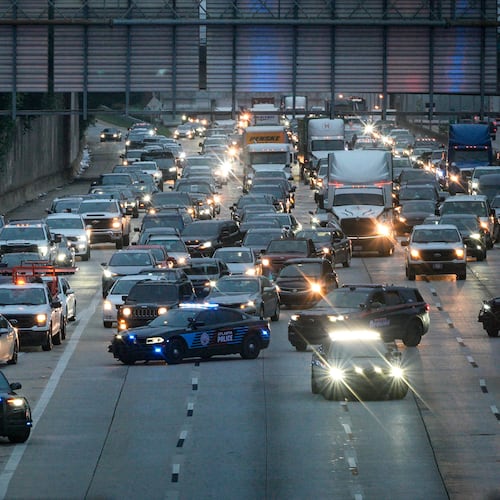It’s not the worst in the country anymore, but Spaghetti Junction still sits high on the national list of truck bottlenecks in Georgia.
The interchange at I-285 and I-85 (north) was dethroned by the intersection of I-95 and SR 4 in Fort Lee, New Jersey, in the American Transportation Research Institute's annual ranking of top 100 truck bottlenecks.
"Congestion is a persistent issue for our industry and our company specifically," Rich McArdle, president of UPS Freight, said in the ATRI press release. "For UPS, if all of our vehicles are delayed just five minutes a day, every day, it costs our company $114 million a year. In order to combat congestion, many companies must plan operational redundancies to meet their customer needs. Using data like ATRI's bottleneck report can help both companies and elected officials to make more informed decisions."
UPS has a location on Pleasantdale Road, which sits off on exit of Spaghetti Junction.
To determine the worst bottlenecks, ATRI used GPS data from nearly a million trucks traveling each of the 300 freight-significant highway locations.
The five steps in the analysis were:
- Identification of study population through extraction of relevant commercial truck data during all weekdays of the year 2017 at 300 specific locations using an extensive truck GPS database;
- Application of data quality tools and techniques;
- Application of a four-step analysis process that utilizes vehicle time, date and speed information;
- Calculation of total freight congestion values and ranking (congestion index); and
- Production of detailed congestion profiles for the 100 top ranked locations.
ATRI’s analysis found that year-over-year truck speeds across the top 10 locations dropped by an average of nearly 9 percent as congestion worsened along the nation’s busiest freight roadways, according to the company’s statement.
Although Spaghetti Junction fell a spot in the ranking, two metro Atlanta locations rose. The intersection of I-75 and I-285 (north) rose a spot, from No. 4 last year to No. 3. And the area where I-20 intersects with I-285 (west) rose from No. 17 last year to crack the top 10, finishing No. 9 this year.
» Report: 200 dead from rollovers in Georgia since 2001
» Photos: Weird things that have snarled Atlanta traffic
» Atlanta ranks among America's 'most congested' cities
I-285 at I-85 (north)
National rank: 2
Average speed: 34.8
Average speed during peak times: 22.9
Nonpeak average speed: 40.6
Peak average speed percent change: -7.35 percent
I-75 at I-285 (north)
National rank: 3
Average speed: 37.9
Average speed during peak times: 27.4
Nonpeak average speed: 42.8
Peak average speed percent change: -9.91 percent
I-20 at I-285 (west)
National rank: 9
Average speed: 44.5
Average speed during peak times: 38.3
Nonpeak average speed: 47
Peak average speed percent change: -5.06 percent
Those three aren’t the only bottlenecks Atlanta can claim, however.
The interchange of I-20 at I-285 on the east side ranked No. 25; I-20 at I-75/I-85 (the Connector) was No. 54; and the I-75/I-85 intersection was No. 91 out of 100.
ATRI doesn’t factor in tractor-trailer accidents at these locations.
Just this week, a truck hauling frozen broccoli overturned on the ramp from I-285 to I-75 south of Atlanta, shutting down the ramp.
A 2015 Bloomberg Business study of ATRI data found that more than 200 trucks flipped in the Atlanta area from 2001 to 2015. And more than 200 people died in truck rollovers in Georgia during that time.
The only city to have more freight bottlenecks than Atlanta was Houston, which had nine.
» Study: Georgia's $10 billion traffic plan could reduce delays
» Ranking: Georgia drivers ranked among worst in the nation for 2018
About the Author
The Latest
Featured





